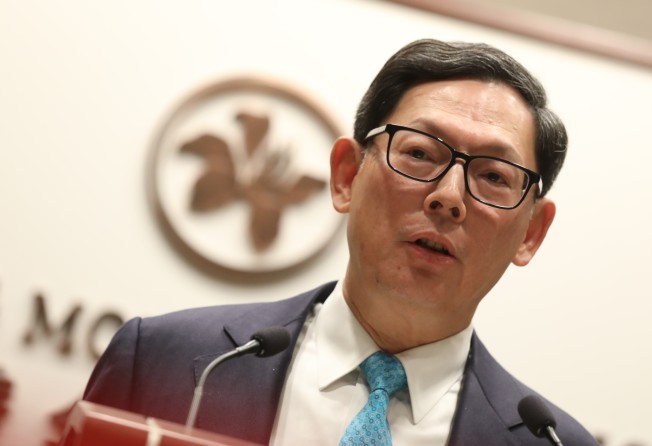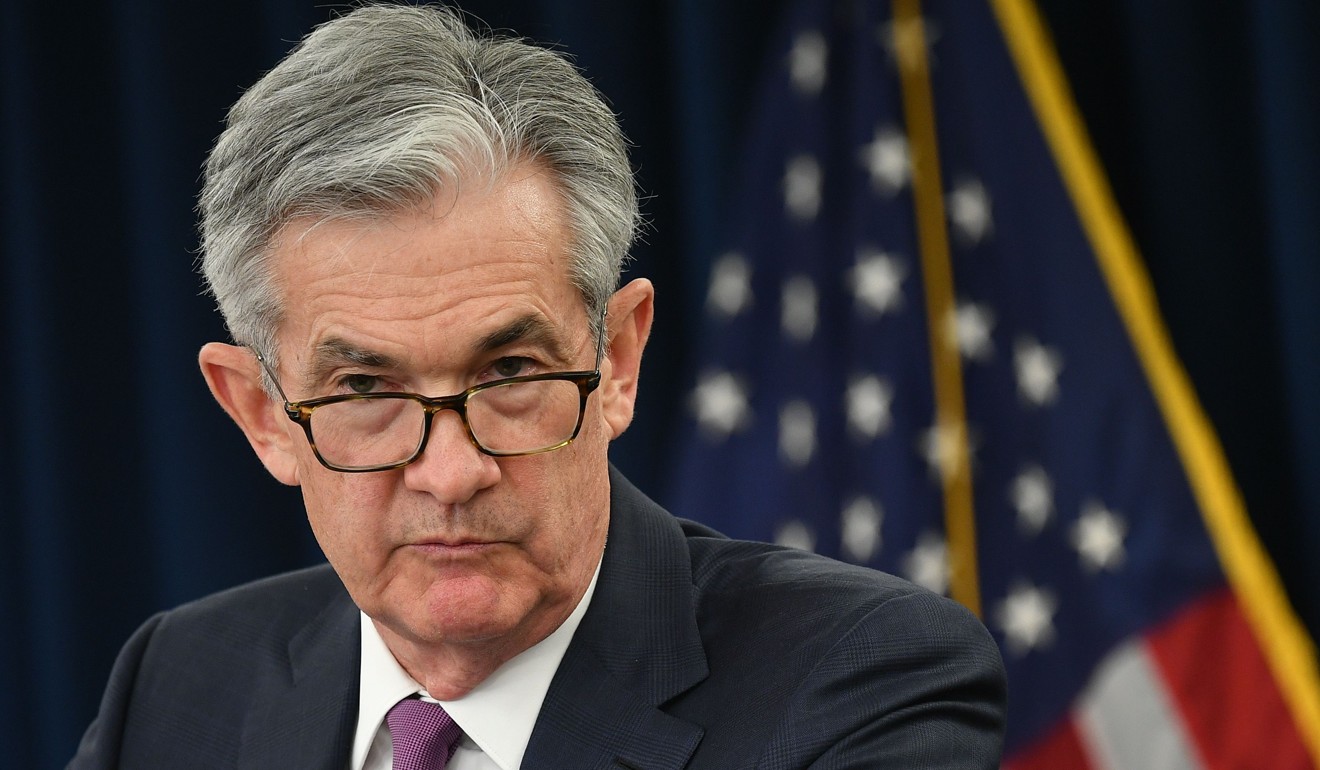Beware volatility, warns HKMA chief Norman Chan, as Hong Kong leaves interest rate unchanged in lockstep with US Fed
- Hongkongers should ‘stay vigilant in managing the potential risks arising from market volatilities’, said the head of the city’s de facto central bank
- With growth dampened by the trade war, the US Fed has signalled it is reversing course on the rising interest rate cycle that began in December 2015

Hong Kong’s de facto cental bank has reiterated its warning for borrowers and investors to beware of volatile market changes, as it kept the city’s base interest rate unchanged in lockstep with the US Federal Reserve’s monetary policy overnight.
“Future direction of fund flows has become more uncertain in view of the increased uncertainties in the Fed’s monetary policy direction. The public should stay vigilant in managing the potential risks arising from market volatilities,” said Norman Chan Tak-lam, chief executive of the Hong Kong Monetary Authority (HKMA), in an e-mailed statement.
Hong Kong manages its monetary policy in sync with the US Fed to maintain the stability of the Hong Kong dollar, which has been pegged to the US currency since 1983. That means every interest rate increase or cut in the US is mirrored in Hong Kong.
The year-long US-China trade war is weighing on the world’s economic growth, with the International Monetary Fund (IMF) predicting China’s 2019 increase to slow to 6.2 per cent, while Hong Kong’s Trade Development Council expects the city’s exports to rise 2 per cent this year, down from an earlier forecast of 5 per cent.
Amid the slower growth, the US Fed has signalled that it is reversing course on the rising interest rate cycle that began in December 2015 with nine consecutive rate increases.
The rising cycle had ended nearly a decade of cheap financing that had flushed the world’s markets with low-interest loans, fuelling a property bull run that drove Hong Kong’s home prices to the top of the world.
“This week marks the beginning of a new stage in the cycle not only for the Fed, but also for the European Central Bank and other emerging market central banks such as Indonesia, Russia,” wrote Rick Rieder, BlackRock’s chief investment officer of global fixed income, in an e-mailed commentary.
“That shift will be characterised by easier policy and broad support for maintaining the global economic expansion, with or without global trade wars. That does not mean that we should expect to see the Fed persistently cut rates toward the zero bound, but the FOMC [Federal Open Market Committee] is more likely to begin cutting rates, and the committee is much more tuned in to the need for monetary policy help, alongside the other central banks around the world.”
The US Fed rate now stands at between 2.25 per cent and 2.5 per cent while the HKMA’s base rate stands at 2.75 per cent, compared with almost zero before the rate rise cycle began.
Until September, commercial banks in Hong Kong left their prime mortgage rates unchanged at the 2008 level even when the HKMA kept raising its base lending rate in lockstep with the US.
A change in direction for central-bank interest rates now may not translate into immediate benefits for the city’s borrowers, who held a combined HK$1.31 trillion (US$168 billion) in mortgage loans as of the end of last year.
Hong Kong brokers believe the city’s commercial banks would not immediately need to cut their mortgage rates or other personal interest rate.
“While the Fed and the HKMA have increased official interest rates nine times since 2015, the commercial banks have only increased their prime lending rates once. As such, even if the US Fed and HKMA had a rate cut, the local lenders are unlikely to follow the cut immediately,” said Jasper Lo, chief of investment strategies at Eddid Securities and Futures.
The market expects the Fed to cut interest rates after US economic data showed a slowdown in job creation in May.
“We will act as needed, including promptly, if that’s appropriate and use our tools to sustain the expansion,” said US Federal Reserve chairman Jerome Powell on Wednesday.

Powell said the US-China trade war had caused a major dent in sentiment, but a trade deal with China would not necessarily take rate cuts off the table.
“As inflation is taking longer to return to target and trade uncertainty is weighing on the global outlook, the Fed is singing a dovish tune,” said Kerry Craig, global market strategist of JPMorgan Asset Management.
For Asia markets, Craig said the Fed meeting was a positive, and bond yields are likely to move lower, though the market may have already priced in.
“A single rate cut will do little to stimulate growth, and the market is unlikely to be satiated, demanding further easing. But multiple rate cuts would suggest more persistent economic weakness and a poorer outlook for risk assets,” Craig said.
“The real question is whether the Fed has created sufficient flexibility to avoid getting locked into a prolonged rate cut cycle if needed.”